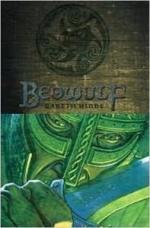[4] The H.-So. glossary is very inconsistent in referring to this passage.—’Sibbe’ (154), which H.-So. regards as an instr., B. takes as accus., obj. of ‘wolde.’ Putting a comma after Deniga, he renders: He did not desire peace with any of the Danes, nor did he wish to remove their life-woe, nor to settle for money.
[5] Of this difficult passage the following interpretations among others are given: (1) Though Grendel has frequented Heorot as a demon, he could not become ruler of the Danes, on account of his hostility to God. (2) Hrothgar was much grieved that Grendel had not appeared before his throne to receive presents. (3) He was not permitted to devastate the hall, on account of the Creator; i.e. God wished to make his visit fatal to him.—Ne ... wisse (169) W. renders: Nor had he any desire to do so; ‘his’ being obj. gen. = danach.
[8]
IV.
BEOWULF GOES TO HROTHGAR’S ASSISTANCE.
{Hrothgar sees no way of escape from the persecutions of Grendel.}
So
Healfdene’s kinsman constantly mused on
His
long-lasting sorrow; the battle-thane clever
Was
not anywise able evils to ’scape from:
Too
crushing the sorrow that came to the people,
5
Loathsome and lasting the life-grinding torture,
{Beowulf, the Geat, hero of the poem, hears of Hrothgar’s sorrow, and resolves to go to his assistance.}
Greatest
of night-woes. So Higelac’s liegeman,
Good
amid Geatmen, of Grendel’s achievements
Heard
in his home:[1] of heroes then living
He
was stoutest and strongest, sturdy and noble.
10 He bade
them prepare him a bark that was trusty;
He
said he the war-king would seek o’er the ocean,
The
folk-leader noble, since he needed retainers.
For
the perilous project prudent companions
Chided
him little, though loving him dearly;
15 They
egged the brave atheling, augured him glory.
{With fourteen carefully chosen companions, he sets out for Dane-land.}
The
excellent knight from the folk of the Geatmen
Had
liegemen selected, likest to prove them
Trustworthy
warriors; with fourteen companions
The
vessel he looked for; a liegeman then showed them,
20 A sea-crafty
man, the bounds of the country.
Fast
the days fleeted; the float was a-water,
The
craft by the cliff. Clomb to the prow then
Well-equipped
warriors: the wave-currents twisted
The
sea on the sand; soldiers then carried
25 On the
breast of the vessel bright-shining jewels,
Handsome
war-armor; heroes outshoved then,
Warmen
the wood-ship, on its wished-for adventure.




